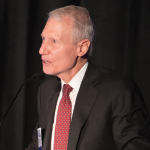
Trio President Mark Persky, MD
SCOTTSDALE—Otolaryngologists and head and neck surgeons from around the country and the world ventured to a resort in the Arizona desert to attend the Triological Society Combined Sections Meeting, held January 18–20 in Scottsdale. Meeting attendees listened to and traded thoughts on surgical techniques, ways to overcome burnout, and many other topics. Triological Society officials said that 520 physicians attended this year’s meeting.
Vivek Pandrangi, BA, a third-year medical student at Virginia Commonwealth University in Richmond, who presented a poster on sinusitis among hematologic transplant patients, said it was his first year attending the conference. “For me, it’s just been an exciting opportunity to present research and also get the time to network, from students to different faculty,” he said. “That sort of communication you don’t really get elsewhere. That’s why I’m pretty excited to be here. The talks are just very informative.”
Presidential Address Focuses on Leadership
In his Triological Society Presidential Address, Mark Persky, MD, discussed the importance of mentoring. “Is mentoring our obligation? The answer is a definite ‘yes’—not only for the members of the Triological, but also for our entire profession, both academics and non-academics,” he said. “What better legacy is possible than having the next generation of physicians become better than we are, by learning from our mistakes, observing our guiding activities, and heeding our advice?”
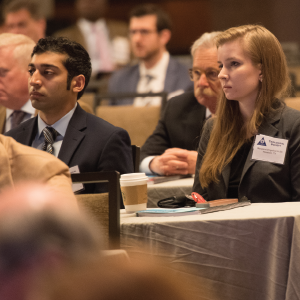
More than 500 physicians attended this year’s Combined Sections Meeting.
© america365 / shutterstock.com
Mentoring, he added, often comes in brief interactions, such as giving a few words of support during a stressful time; though they might seem insignificant to senior faculty members, these moments often have a lasting effect on the people they’re mentoring. “Such a brief experience may represent a lifetime memory for someone looking for support and guidance,” he said. “Don’t underestimate these brief moments of contact.”
He also stressed the importance of having a sense of humor as a mentor, and acknowledging when you may have made a mistake. “We should realize when we cross the line of being reasonable, and not only apologize but also be self critical and smile about [the fact that] we just may have done a dumb thing. You will gain respect and feel better about yourself.”
Dr. Persky also offered several words of wisdom, the first few of which are directed to residents:
- “Always focus on patients’ care and needs,” he said. “You can never be criticized for that.”
- Be prepared for the unexpected. He suggested always extracting as much information as possible from pre-operative imaging, formulating the 3-D anatomy, with all the landmarks and vital structures, and told residents to “always, always operate using both hands. They are your best instruments.”
- When operating, he stressed the importance of exposure. “If you know where a structure is, you know where it is not, including the carotid artery, the facial nerve, and other vital structures. Identify those important structures first, and then you can go about mobilizing and resecting the tumor.”
- Learn to be a good first assistant before trying to be a surgeon. “It’ll improve your operative skills.”
- Learn from each mistake. “We learn more from our mistakes than from our successes.”
- Try to make an active attempt to learn at least one new thing from each case that you perform, no matter how experienced you are.
- Don’t focus on speed. “It’s not the fastest surgeon who is the most effective during an emergency; it’s the one who keeps his cool and does what is necessary.”
- Build confidence; don’t tear it down. “Don’t be the professor who asks junior colleagues the questions to find out what they don’t know. Ask the questions to find out what they do know.”
- There’s no substitute for spending time with patients. “Listen to them, talk to them, examine them, answer their questions, and be there for them and their families in times of need.”
- Take time to smell the roses. “We all have different personal goals, some of them focusing on work and career and some on family and lifestyle. … If you do not enjoy what you are doing, you will not succeed.”
Tom Collins is a freelance medical writer based in Florida.
Kofi Boahene, MD, Awarded Hannley Award for Trio Thesis
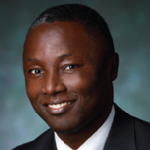 Kofi Boahene, MD, associate professor of otolaryngology–head and neck surgery and dermatology at the Johns Hopkins University School of Medicine in Baltimore, was awarded the Dr. Maureen Hannley Award, given in honor of the excellence of a Triological thesis in the category of alternative science.
Kofi Boahene, MD, associate professor of otolaryngology–head and neck surgery and dermatology at the Johns Hopkins University School of Medicine in Baltimore, was awarded the Dr. Maureen Hannley Award, given in honor of the excellence of a Triological thesis in the category of alternative science.
Dr. Boahene won for his findings on a new technique, using the omohyoid muscle from the front of the neck, that can potentially be used to restore movements of patients with facial paralysis. Donor muscles that have traditionally been considered are typically too large. “The omohyoid muscle can be harvested as a free flap, [and] it has adequate pedicle to be used for microvascular transfer,” Dr. Boahene said. “It’s a good size match and substitute for the orbicularis (oculi muscle), for which we currently don’t have any option for dynamic replacement.”
Roger Crumley, MD, Brookhouser Award of Excellence
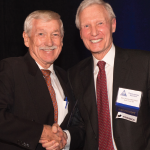 This year’s Patrick E. Brookhouser, MD, Award of Excellence was presented to Roger Crumley, MD, MBA, professor emeritus of otolaryngology–head and neck surgery at the University of California, Irvine. The award recognizes Dr. Crumley’s significant scientific and service contributions to the Triological Society and otolaryngology–head and neck surgery, and how he embodies and perpetuates the values and ideals of the society. He is a past director of the American Board of Otolaryngology (ABOto) and former president of several societies, including the Triological Society, the American Academy of Facial Plastic and Reconstructive Surgery, and the American Laryngological Association.
This year’s Patrick E. Brookhouser, MD, Award of Excellence was presented to Roger Crumley, MD, MBA, professor emeritus of otolaryngology–head and neck surgery at the University of California, Irvine. The award recognizes Dr. Crumley’s significant scientific and service contributions to the Triological Society and otolaryngology–head and neck surgery, and how he embodies and perpetuates the values and ideals of the society. He is a past director of the American Board of Otolaryngology (ABOto) and former president of several societies, including the Triological Society, the American Academy of Facial Plastic and Reconstructive Surgery, and the American Laryngological Association.
Dr. Persky praised Dr. Crumley as “a leader amongst leaders, who has allowed otolaryngology–head and neck surgery to spread its expertise and influence beyond just ear, nose, and throat.”
Robert Miller Honored
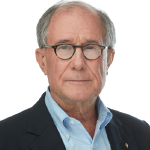 Robert Miller, MD, MBA, was recognized as a Guest of Honor by both the Western Section and the Triological Society as a whole.
Robert Miller, MD, MBA, was recognized as a Guest of Honor by both the Western Section and the Triological Society as a whole.
Dr. Persky commented that, as a former executive director of the American Board of Otolaryngology (ABOto), founding editor of ENTtoday, and an “active and committed member” of the Triological Society, Dr. Miller dealt “compulsively and thoughtfully” with myriad details, from maintenance of certification to subspecialty certification. “The society thanks you for all that you’ve done for us,” he said.
Western Section vice president Clough Shelton, MD, credited Dr. Miller with getting the ABOto on “firm financial footing.” He added, “Bob’s done a great job presenting the board and the specialty of otolaryngology to the larger house of organized medicine.”
Self Regulation
Dr. Miller said he was moved by the recognition. “I can’t tell you how incredibly honored I am to receive this recognition,” he said. “It’s very meaningful.” He added that serving as editor of ENTtoday was “the cherry on the sundae for me. It’s been one of the most enjoyable experiences I’ve had in any of my medical activities.”
Dr. Miller reminded the audience that professional self-regulation—otolaryngologists establishing their own standards for knowledge and performance, and ensuring they are met —isn’t a “right.” He said, “It’s something that society gives us, and [it] can be taken away,” just as self-regulation of the legal profession in Great Britain, Australia, and Wales has been replaced by government oversight.
He added that self-regulation can be improperly manipulated, and cautioned against “excessive focus on finances, lifestyle, and self-interest.”
“We have an opportunity to maintain physician self-regulation,” he said. “I think it’s really important that we all work together to make self-regulation meaningful and work effectively. If we don’t, the alternatives will be worse.”